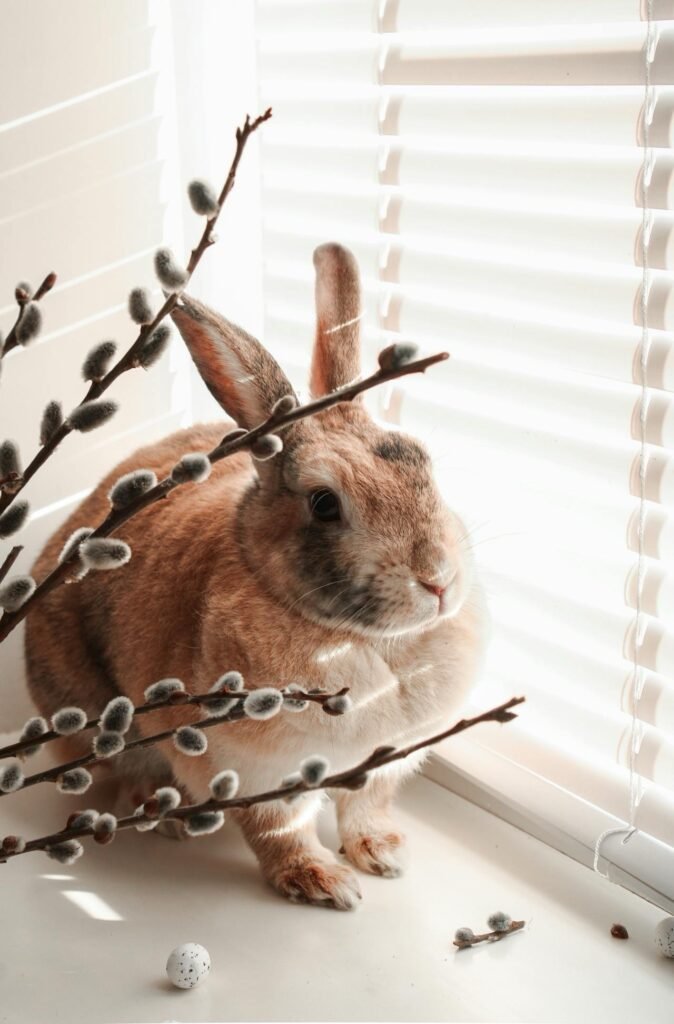If you suspect your bunny might be expecting, you’re probably eager to find out sooner rather than later. Whether you’re a breeder anticipating a new litter or a pet owner who didn’t realize your rabbits had been socializing a little too much, knowing how to recognize pregnancy in rabbits is crucial.
So, how soon can you tell if a rabbit is pregnant? Typically, you can start noticing signs of pregnancy as early as 10-14 days after mating. However, it’s not always obvious, and some bunnies like to keep you guessing. Let’s hop into the details of how to tell if your rabbit is pregnant and what to do next.
Understanding Rabbit Pregnancy
Before diving into the signs, it’s helpful to understand a little about rabbit reproduction. Rabbits are induced ovulators, which means a female rabbit (doe) releases eggs when she mates. This makes pregnancy highly likely after mating, assuming both the doe and the male rabbit (buck) are fertile.
Rabbit pregnancies last around 30-31 days, so once you confirm your bunny is pregnant, you’ve got about a month to prepare for the arrival of the kits (baby rabbits).
Signs Your Rabbit is Pregnant
Rabbits aren’t exactly forthcoming about their pregnancies, but there are a few clues to look for. Some signs show up earlier than others, so let’s break them down by timeline:
1. Changes in Behavior (As Early as 7-10 Days)
Your doe’s behavior might be the first thing to clue you in. Pregnant rabbits often become more territorial or grumpy, especially if you try to handle them. You might notice:
• Nesting instincts: She may start digging, rearranging bedding, or pulling fur to create a cozy nest (though this usually happens later in the pregnancy).
• Increased aggression: If your normally sweet bunny starts growling or lunging, pregnancy hormones might be to blame.
2. Palpation (10-14 Days After Mating)
Palpation is a method of gently feeling the doe’s abdomen to check for developing kits. This is one of the most reliable ways to confirm pregnancy early on, but it requires a gentle touch and some practice.
How to palpate:
1. Place the doe on a flat surface, like a table or your lap.
2. Gently cup your hand under her belly, just in front of her hind legs.
3. Feel for small, grape-like lumps in her uterus. These are the developing kits.
Important: If you’re unsure about palpation or worried about harming your bunny, consult a rabbit-savvy vet for confirmation.
3. Increased Appetite (10-14 Days)
Pregnant does often eat more to support their growing kits. If your bunny suddenly seems extra hungry or is munching on hay non-stop, it could be a sign she’s expecting. Make sure to provide plenty of fresh food and water to meet her nutritional needs.
4. Weight Gain (14-21 Days)
By the second or third week of pregnancy, you might notice your doe gaining a little weight. However, weight gain alone isn’t a definitive sign, as some rabbits can pack on the pounds just from overeating.
5. Nesting Behavior (27-30 Days)
Nesting is one of the clearest signs that your rabbit is nearing the end of her pregnancy. Pregnant does will:
• Pull fur from their belly and chest to line the nest.
• Rearrange bedding or hay to create a cozy space.
If you see your rabbit frantically nesting, it’s time to get ready—the kits will likely arrive within a day or two.
How to Confirm Pregnancy
While the signs above can give you a good idea, the only way to be 100% sure your rabbit is pregnant is to consult a vet. A rabbit-savvy vet can confirm pregnancy through palpation, an ultrasound, or other diagnostic tools.
Common Mistakes When Identifying Pregnancy
It’s easy to misinterpret your rabbit’s behavior or physical changes, so let’s clear up a few common misconceptions:
1. False Pregnancy: Rabbits can experience false pregnancies, where hormonal changes mimic pregnancy symptoms. Your doe might even build a nest, but no kits will arrive.
2. Weight Gain from Overeating: An increase in appetite doesn’t always mean pregnancy—it could just mean your bunny is enjoying her snacks a little too much.
3. Stress-Induced Behavior: Digging or grumpiness can also be signs of stress, so consider environmental factors before jumping to conclusions.
What to Do If Your Rabbit is Pregnant
If you’ve confirmed that your rabbit is pregnant, congratulations! Here’s how to help her through the next few weeks:
1. Provide a Nest Box: Place a nest box in her enclosure around Day 27. Fill it with soft, clean bedding or hay to give her a safe space to deliver and care for her kits.
2. Minimize Stress: Pregnant rabbits need a calm, quiet environment. Keep loud noises, other pets, and unnecessary handling to a minimum.
3. Offer a Nutritious Diet: Ensure she has unlimited access to fresh hay, quality pellets, and fresh water. Adding small amounts of dark leafy greens can also boost her nutrition.
4. Monitor Closely: Watch for signs of distress or complications, such as lack of appetite, lethargy, or bleeding. If anything seems off, contact a vet immediately.
FAQs About Rabbit Pregnancy
Q: How can I prevent unwanted pregnancies in my rabbits?
A: The best way to prevent unwanted pregnancies is to spay and neuter your rabbits. This also helps reduce hormonal aggression and other health risks, like uterine cancer in females.
Q: Can I handle my rabbit while she’s pregnant?
A: It’s best to limit handling, especially later in the pregnancy. If you need to move her, be gentle and support her body to avoid stress or injury.
Q: What should I do if my rabbit isn’t building a nest?
A: Some first-time moms might not know what to do. You can help by providing a nest box and gently placing hay or bedding inside.
Q: How soon can I reintroduce the male rabbit?
A: Male rabbits should be kept separate from the doe and her kits. Not only can the male stress the mother, but she can also get pregnant again almost immediately after giving birth.
Final Thoughts
Figuring out if your rabbit is pregnant can feel like a mix of detective work and waiting game. While some signs, like nesting and weight gain, are clear, others can be subtle or even misleading. By keeping an eye on your bunny’s behavior and consulting a vet if needed, you can ensure she gets the care and support she needs during this exciting (and busy!) time.
So, if your bunny is showing signs of pregnancy, get ready to welcome some adorable new kits into the world—and maybe invest in a bigger hay stash while you’re at it!
Share

